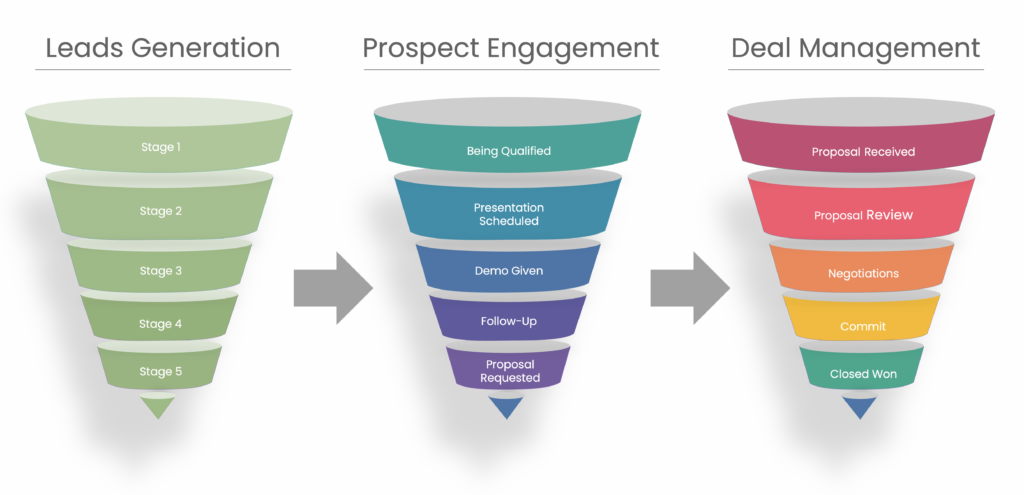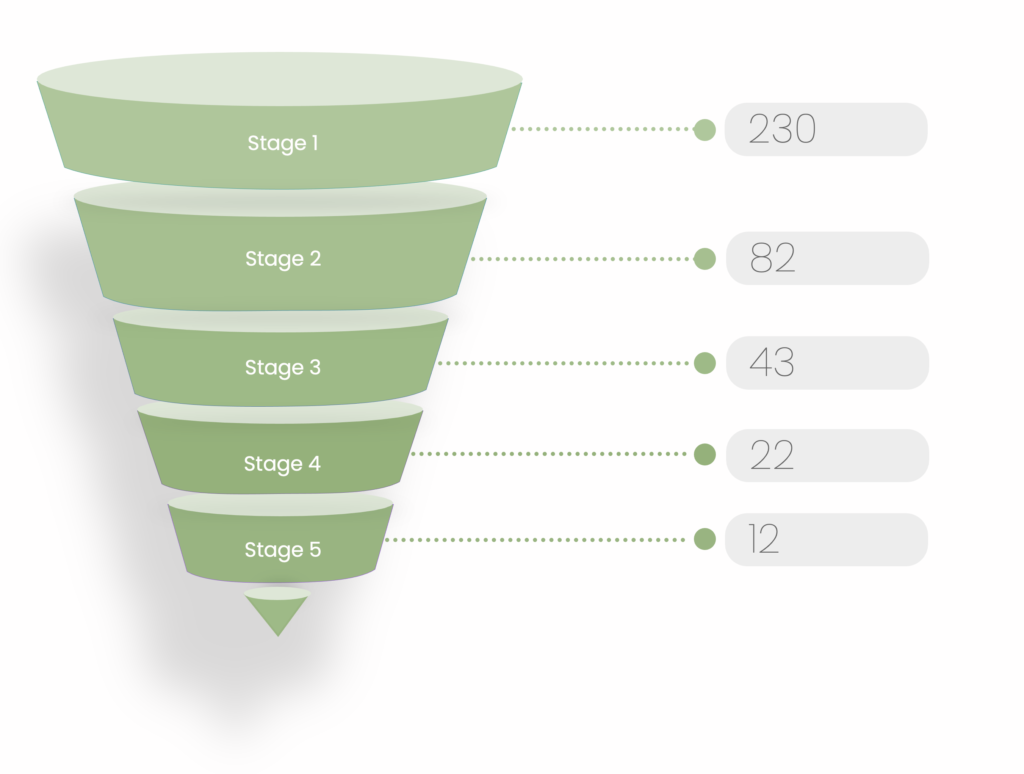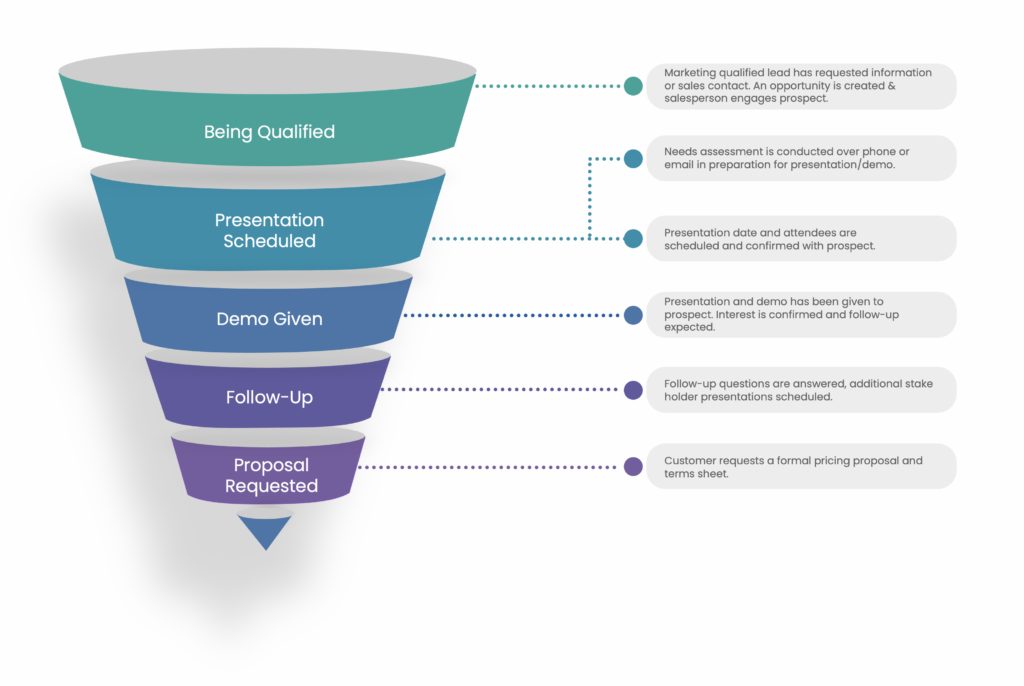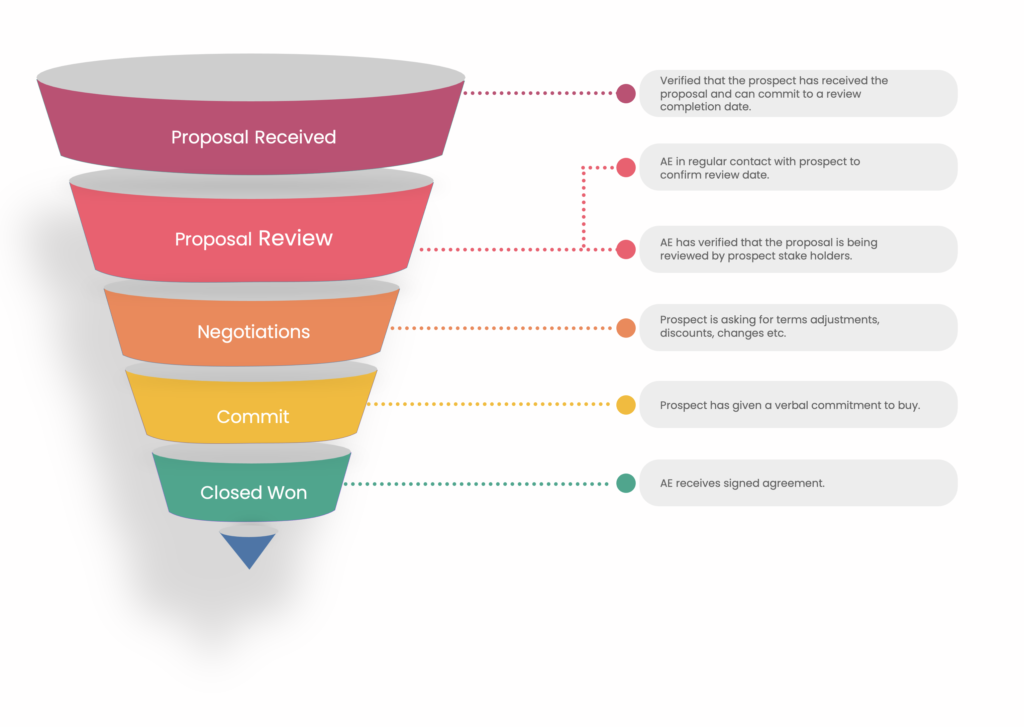Sales Pipeline
Selling Process
We divide the sales pipeline into three phases, each with distinct processes. Each process includes a sales funnel with stages, action steps, and forecast reporting.
1. Lead Generation – The process of generating interested prospects or hand raisers.
2. Prospect Engagement – The process of qualifying, educating, and inspiring prospects, moving them to the proposal phase.
3. Deal Management – The process of confirmation, validation & negotiation on the way to closing an opportunity.

Leads Pipeline
The Leads Pipeline Funnel will be detailed in the Leads Playbook to come…

Engagement Pipeline
The Engagement process is broke down into 5 distinct stages to manage, support and facilitate a prospect’s journey to requesting a sales proposal. Requesting a sales proposal is an important hallmark in identifying an opportunity that has a higher likelihood of closure.
Marketing qualified leads enter the Qualifying Pipeline once they have requested information or sales contact. These details are outlined in the Leads Pipeline process

Deal Pipeline
Lorem Ipsum is simply dummy text of the printing and typesetting industry. Lorem Ipsum has been the industry’s standard dummy text ever since the 1500s, when an unknown printer took a galley of type and scrambled it to make a type specimen book. It has survived not only five centuries, but also the leap into electronic typesetting, remaining essentially unchanged. It was popularised in the 1960s with the release of Letraset sheets containing Lorem Ipsum passages, and more recently with desktop publishing software like Aldus PageMaker including versions of Lorem Ipsum

Sales Dashboard
Lorem Ipsum is simply dummy text of the printing and typesetting industry. Lorem Ipsum has been the industry’s standard dummy text ever since the 1500s, when an unknown printer took a galley of type and scrambled it to make a type specimen book. It has survived not only five centuries, but also the leap into electronic typesetting, remaining essentially unchanged. It was popularised in the 1960s with the release of Letraset sheets containing Lorem Ipsum passages, and more recently with desktop publishing software like Aldus PageMaker including versions of Lorem Ipsum

ℹ️ Additional Information
Why this is important
What is a sales pipeline?
A sales pipeline is a visual representation of the stages that a potential customer goes through during the sales process, from initial contact to final purchase. It serves as a systematic and organized framework for sales teams to manage and track their interactions with leads and prospects. Typically divided into stages such as lead generation, qualification, proposal, negotiation, and closing, the sales pipeline allows sales professionals to monitor the progress of deals and identify potential bottlenecks. By visualizing the entire sales journey, sales managers and representatives can prioritize their efforts, allocate resources effectively, and forecast future revenue based on the likelihood of deals progressing through each stage. The sales pipeline is an essential tool for sales organizations, providing clarity, accountability, and a structured approach to converting leads into satisfied customers.
Why is a defined sales pipeline important?
A defined sales pipeline is crucial to a sales organization for several key reasons:
- Clear Process Visibility: A defined sales pipeline provides a clear and visual representation of the sales process, allowing sales teams and managers to see the progression of deals through each stage. This transparency enhances overall process visibility, making it easier to identify the current status of individual deals and the overall health of the sales funnel.
- Effective Lead Management: A structured sales pipeline helps in organizing and managing leads effectively. By categorizing leads into different stages based on their level of qualification and engagement, sales teams can prioritize their efforts on leads that are more likely to convert, improving efficiency and resource allocation.
- Accurate Forecasting: The sales pipeline serves as a foundation for accurate sales forecasting. By understanding the typical conversion rates at each stage of the pipeline, sales organizations can make informed predictions about future revenue and adjust strategies accordingly. This is crucial for budgeting, resource planning, and setting realistic sales targets.
- Strategic Decision-Making: A well-defined sales pipeline facilitates strategic decision-making. Sales managers can identify areas of improvement, analyze conversion rates, and implement targeted strategies to address specific stages where deals commonly stall or are lost. This data-driven approach leads to continuous improvement in sales performance.
- Sales Team Accountability: The sales pipeline establishes a framework for accountability within the sales team. Each stage represents specific responsibilities and milestones, making it easier to track individual and team performance. This accountability fosters a culture of responsibility and encourages sales professionals to actively manage their opportunities.
- Efficient Resource Allocation: With a clear understanding of where each deal stands in the pipeline, sales organizations can allocate resources more efficiently. This includes optimizing the allocation of time, personnel, and budget to focus on areas that contribute most to closing deals and driving revenue.
- Customer Relationship Management: The sales pipeline helps sales representatives manage customer relationships more effectively. By tracking interactions and understanding customer needs at each stage, sales professionals can tailor their communication and strategies, ultimately building stronger, more personalized relationships with clients.
- Adaptability to Market Changes: A defined sales pipeline allows organizations to adapt to changes in the market and buyer behavior. By closely monitoring the pipeline, sales teams can quickly identify shifts in customer preferences or market dynamics, enabling them to adjust their approaches and stay responsive to evolving trends.
In summary, a well-defined sales pipeline is instrumental in providing structure, visibility, and strategic insights for a sales organization. It streamlines the sales process, enhances decision-making, and contributes to overall sales efficiency and success.
